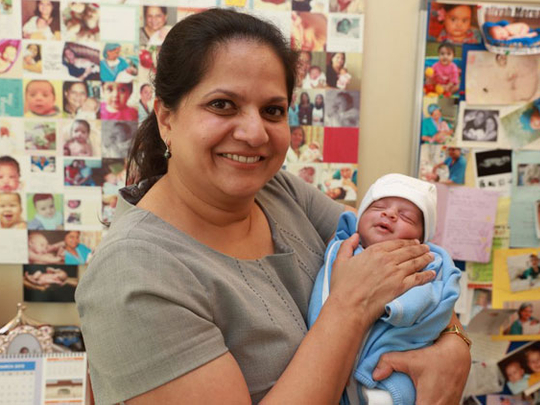
Dubai. An Emirati woman who had a kidney transplant three years ago gave birth to her first child in the last week of February.
Pregnancy in kidney transplant patients is considered risky due to a high rate of complications for the mother, baby and the transplanted organ, said a senior doctor from Dubai Health Authority (DHA).
Latifa Hospital, one of the largest maternity and children’s hospital in the UAE, has seen only one such successful pregnancy in the past 10 years, said Dr Mona Tahlak, head of obstetrics and gynaecology at the DHA.
The case is the first of its kind in Dubai, claimed Mediclinic City Hospital where the mother, M.M., 28, gave birth to a boy weighing two kilos through normal delivery at 35 weeks.
Pregnancy in kidney transplant patients usually results in babies delivered through Caesarean procedure.
Dr Tahlak told Gulf News, “It is rare to come across such cases. In 10 years, we have seen only one successful case. After a renal transplant, the reproductive function has to be restored, and close monitoring is required to ensure the mother and baby are stable.”
The new mother has named her son Khalid Mohammad, after her brother Khalid who donated his kidney to her. She was suffering from renal failure, and was operated in Germany.
A multi-disciplinary medical team comprising a transplant nephrologist surgeon, obstetrician, urologist and paediatrician monitored the mother’s progress, said Dr Elsa Menezes, specialist obstetrician and gynaecologist at Mediclinic City Hospital and the patient’s doctor.
Speaking to Gulf News, Dr Menezes said, “Fertility is an issue in an organ transplant case. Most pregnancies in transplant cases show trends in miscarriages, stillbirths, ectopic pregnancies, preterm births, low birth weight infant and neonatal deaths.”
She explained that for the mother the risks include organ failure, infection, ectopic pregnancy (pregnancy that occurs outside the uterus), gestational diabetes, hypertension, preeclampsia (high blood pressure and significant amounts of protein in the urine) and increased likelihood of Caesarean delivery.
For the foetus, the risks include prematurity in up to 50 per cent of newborns, intrauterine growth retardation, low birth weight, immune deficiency and congenital anomalies, said the doctor.
Dr Menezes said that the timing of pregnancy is very important. “Waiting for at least a year post transplant is recommended. Studies show a better success rate and fewer complications if conception occurs more than 24 months after the transplantation.”
In early 2012, the patient approached the hospital for fertility advice. “She has been a remarkable patient, complying with all the medial requirements from therapies to medications and appointments. We had to optimise her condition so she could proceed with her pregnancy. We induced labour at 35 weeks because the patient developed preeclampsia,” she said.
The mother told Gulf News, “My son is healthy, though he is still tiny. I feel wonderful having a child after four years of marriage. I hope he grows up to be a businessman like his father. I also hope to have a daughter one day.”












